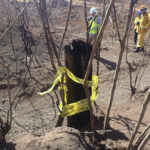Standard & Poor’s Ratings Services announced that it has affirmed the ‘AA-‘ counterparty credit and financial strength ratings on property/casualty insurer Hannover Re (Bermuda) Ltd. (HRB), with a negative outlook.
“The ratings are based on HRB’s status as core to its parent, Hannover Rueckversicherungs AG (Hannover Re),” said the bulletin. “HRB is a key strategic holding of Hannover Re given its common customer base with its parent and Hannover Re’s commitment to the property catastrophe market. The rating on HRB is also based on its parent’s equity contributions, corporate strategy, aligned senior management, and common name. HRB’s very strong capital adequacy and very strong operating performance further support the rating. However, a concentration in property catastrophe risk does cause HRB to have a high-risk profile.”
S&P explained that the negative outlook on HRB was “in large part because of its core status within the Hannover Re Group, which has a negative outlook.”
The bulletin indicated that HRB “is positioned to exploit the adequate rates within the property catastrophe market.” S&P noted, however that “pricing levels for property catastrophe have already started to decline in 2003, but rates are expected to remain adequate and support HRB’s operating performance through 2004.”
S&P said it expects the company’s “operating performance to remain very strong, with its combined ratio at roughly 60% in 2004 and 2005. HRB’s surplus is expected to remain relatively constant, as HRB will pay large dividends to Hannover Re.”.
The bulletin cited the following as “Major Rating Factors:
— Strategic importance to parent. HRB is considered core to its parent company, Hannover Re, because of its equity contribution, stop-loss agreement, integrated corporate strategy, compatible business model, aligned senior management, and common name.
— Integrated corporate strategy. HRB is integral to its parent’s corporate strategy because it provides the property catastrophe line of business. Hannover Re’s strategy is to transfer all of its property catastrophe policies at renewal to HRB, creating a company at the forefront of this sector and pooling the catastrophe modeling experience, thus providing a higher return.
— Stop-loss agreement. The parent company has provided an accident-year stop-loss agreement for HRB, which covers all business written by HRB. This agreement began Jan. 1, 2002, and is renewable annually. The agreement is expected to be renewed for 2004.
— Common customer base. HRB’s business model is compatible with that of its parent company because HRB sells to the same core customers. Currently, the majority of HRB’s business is written from existing Hannover Re customers. HRB’s business position is significantly enhanced by its direct access to existing clients and its ability to exploit the long-term relationships of its parent company.
— Very strong capitalization. HRB’s capital adequacy is viewed as very strong, with a capital adequacy ratio projected at more than 150% at year-end 2003, which is consistent with the rating. Because of increased exposures related to its property catastrophe line of business, capital adequacy declined from the ‘AAA’ level in 2001 and 2002 to the ‘AA-‘ level in 2003. HRB’s capital adequacy is expected to remain very strong but could decline slightly in 2004 because of dividends paid to the parent company in 2004 as well as a modest increase in writings and exposure.
— Very strong operating performance. HRB’s operating performance is viewed as very strong, with an ROR of 94% through June 2003 and a combined ratio of 8%. The combined ratio is unusually low because of the absence of any large catastrophes, but this figure is projected to increase toward more normal levels — near 60% — in 2004 and 2005.
— Line of business concentration/high-risk profile. HRB has a line-of-business concentration, with property catastrophe constituting 59% of gross premiums written through July 2003. HRB’s concentration in this line of business gives it a higher risk profile because of the volatility and severity inherent in property catastrophe. The property catastrophe concentration might increase slightly, as this is HRB’s main focus, and this line of business presents growth opportunities for HRB to expand further into other zones, such as the U.S.”
Was this article valuable?
Here are more articles you may enjoy.

 Viewpoint: The Impact of Behavioral Health on Workers’ Comp
Viewpoint: The Impact of Behavioral Health on Workers’ Comp  EVs Head for Junkyard as Mechanic Shortage Inflates Repair Costs
EVs Head for Junkyard as Mechanic Shortage Inflates Repair Costs  Hawaiian Electric Hits 40-Year Low Ahead of Maui Fire Report
Hawaiian Electric Hits 40-Year Low Ahead of Maui Fire Report  Justice Department Preparing Ticketmaster Antitrust Lawsuit
Justice Department Preparing Ticketmaster Antitrust Lawsuit 